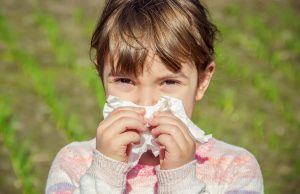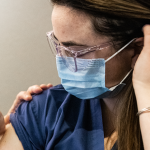Congestion, sneezing and a runny nose can be signs of allergies or illness. With allergy season here, Focus spoke with ear, nose and throat expert Stacey T. Gray, MD, to learn how to determine the difference between viral infections and allergies—and how best to treat symptoms.
As seasons begin to change and spring is upon us, having the ability to differentiate allergies from actual sickness, such as viral sinusitis or COVID-19, is crucial. Allergies can develop at any point in a person’s life, therefore when people experience allergy-like symptoms that mimic those of contagious viral infections, it is important to get the correct diagnosis.
To better understand how to differentiate allergies from viral infections, Focus spoke with Stacey T. Gray, MD, director of the Sinus Center at Mass Eye and Ear, who shared the importance of testing and finding the appropriate treatment options.
Allergy symptoms and treatments
For seasonal allergies, otherwise known as hay fever, symptoms range depending on the severity of the allergy. Symptoms may include congestion, postnasal drip and runny nose—with the mucus typically clear and thin. People also experience sneezing and itchy eyes.
 “The specific time frame that people have allergies can help determine what they might be reacting to,” shared Dr. Gray. “For example, if you’re having allergy symptoms in early spring when tree pollens begin to bloom, that may be your allergy. But, if your symptoms begin in late summer to fall, your allergy may be to weeds as that is when they bloom.”
“The specific time frame that people have allergies can help determine what they might be reacting to,” shared Dr. Gray. “For example, if you’re having allergy symptoms in early spring when tree pollens begin to bloom, that may be your allergy. But, if your symptoms begin in late summer to fall, your allergy may be to weeds as that is when they bloom.”
The one caveat to seasonal allergies is some people will have perennial allergies, meaning they’re allergic to something that’s present all year long. The common ones include dust mites, pet dander and mold. Often with perennial allergies, the symptoms usually include congestion and mucus, and not the sneezing and itchy eyes.
According to Dr. Gray, the best way to confirm a patient has allergies is to see an allergist and receive testing.
For people with allergies who experience congestion and runny nose, nasal steroids sprays are a first-line treatment. There are many over-the-counter medications, like Claritin (Loratadine), Allegra (Fexofenadine) and Zyrtec (Cetirizine), that are helpful as well to minimize allergy symptoms including sneezing, mucus production and watery eyes.
If over-the-counter medicine is not successfully clearing allergy symptoms, a doctor may discuss prescription medication as the next option. After seeing an allergist, some people end up considering immunotherapy, which is a series of allergy shots that help a person become immune to their allergy.
“If you’ve discovered what you’re allergic to, you should try your best to avoid it,” said Dr. Gray. “For example, people who have a pollen allergy need to make sure they keep the windows closed during pollen season and turn their air conditioner on early.”
Sinusitis symptoms and treatments
Sinus inflammation usually is caused by a viral infection, such as influenza, the common cold and increasingly, COVID-19. Viral sinusitis symptoms include congestion, clear runny nose, sneezing and generally feeling unwell. Sometimes people have a low-grade temperature, muscle aches, sore throat, and a small cough.
According to Dr. Gray, usually when patients have bacterial sinus infections, most of the time it happens after a viral infection. Most symptoms of a viral infection will start to clear within a week, however if symptoms don’t clear within 10 days and are progressively getting worse, the viral infection might have developed into a secondary bacterial sinus infection.
Bacterial sinusitis symptoms include persistent nasal drainage that is thick and discolored as well as severe congestion and facial pressure. “Certainly, you can have symptoms of facial pressure, sinus headaches, nasal congestion, and runny nose from many different things, but the discolored drainage and lingering symptoms are key indicators that you might have a bacterial sinus infection,” said Dr. Gray.
When common cold symptoms start, there are precautions people can take to help prevent the sickness progressing into a bacterial sinusitis. Over-the-counter cold medications and decongestants are an effective start.
Pseudoephedrine is a popular decongestant which constricts the blood vessels in the lining of the nose to open airways up so people can breathe better and feel less congested.
 If a person is extremely congested where the nose is fully blocked, a topical nasal decongestant, Afrin, is a great alternative option. However, it is crucial this medication is only uses as directed, as the nose can become addicted to it after multiple uses. This medication should not be used more than 3 days in a row.
If a person is extremely congested where the nose is fully blocked, a topical nasal decongestant, Afrin, is a great alternative option. However, it is crucial this medication is only uses as directed, as the nose can become addicted to it after multiple uses. This medication should not be used more than 3 days in a row.
Another treatment option is a nasal saline spray or saline irrigation—otherwise known as a neti pot—to help clear their nose. “Saline options usually work the best if you decongest the nose first,” said Dr. Gray. “If you use a saline irrigation when you’re super congested, it could make you feel worse.”
Exposing your nose and sinuses to steam from a hot shower often helps clear airways before using saline treatments.
Another option is a nasal steroid spray, such as Flonase (Fluticasone). Start using this at the beginning of a cold to help decrease the swelling in the nose and continue using for several weeks until symptoms fully subside.
“There are studies suggesting that patients can be treated solely with nasal steroids for an acute bacterial infection before starting antibiotics,” said Dr. Gray. “Patients are often concerned about taking antibiotics often because they know it can cause problems with their GI system and disrupt the microbiome, therefore nasal steroids are a great alternative to start.”
However, there are times that antibiotics are necessary. With severe bacterial infections, antibiotics will often be prescribed to knock out a lingering infection. If you are having persistent or severe sinus symptoms you should consult with your primary care doctor about the appropriate treatment.
In contrast to an acute bacterial sinus infection, some patients experience chronic sinus inflammation. According to Dr. Gray, chronic rhinosinusitis is not about an infection, it’s about chronic inflammation of the lining of the sinuses—which is very similar to having asthma, another chronic inflammatory condition that affects the lungs.
The symptoms of chronic sinusitis include discolored mucus, congestion, diminished sense of smell and facial pressure that has lasted for more than three months. For patients experiencing long term sinus symptoms, a consultation with an Otolaryngologist can be very helpful. There are many options for long term medical therapy for chronic rhinosinusitis. For some patients that continue to have symptoms despite medical therapy, sinus surgery becomes an option.
COVID-19 considerations
The main issue when diagnosing patients with COVID-19 rather than sinusitis or allergies is that with each new variant, the actual presentation of symptoms might be different.
“More recently, many of my patients when they’ve had COVID-19 are experiencing a sore throat and upper respiratory symptoms, as opposed to the beginning of the pandemic where people were having more nasal symptoms, like congestion, mucus and loss of smell.”
The majority of COVID-19 symptoms imitate common cold or allergy symptoms, she said. With at home tests so easily accessible, it’s recommended for all symptomatic patients to take a test to help narrow down if it’s COVID-19 or another viral infection.
“Right now, if you have an acute onset of symptoms, we are still telling people to act as if it’s COVID-19 until proven otherwise,” said Dr. Gray.
If you or a loved one is experiencing chronic sinus issues, please reach out to the Sinus Center at 617-573-3030 at Mass Eye and Ear and make an appointment today.
About our expert:

Stacey Tutt Gray, MD, is the Director of the Sinus Center at Mass Eye and Ear, Associate Professor of Otolaryngology–Head and Neck Surgery, Vice Chair of Otolaryngology Education and Residency Program Director at Harvard Medical School.



